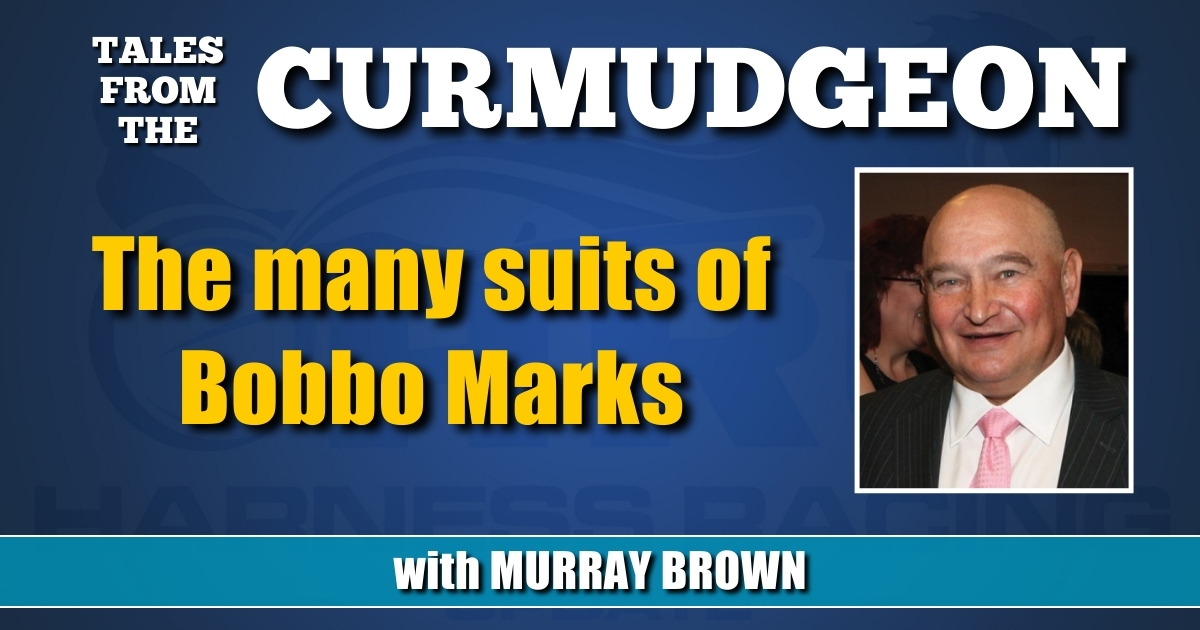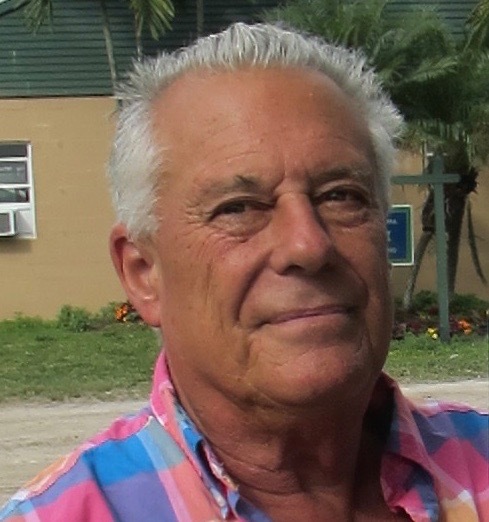The many suits of Bobbo Marks
by Murray Brown
From the fertile brain of Dr Peter Boyce, who said: “First there was Chico, followed by Harpo, Groucho, Gummo and Zeppo. Then came a misspelling, but the same pronunciation, Bobbo Marks, not Marx.”
Bob Marks is what this author would refer to as maybe the only renaissance men that it has been my pleasure to have known.
If you are reading this column, chances are that if you know Bob, you know him only as a harness racing maven.
He has worn several suits in this sport. He started off as a bettor, then became the author of the tip sheet Top Trotter which was sold on a nightly basis at the New York tracks Roosevelt and Yonkers with a short life at The Meadowlands. In the interim, Bobbo fed himself by working days at several advertising agencies in New York and South Florida.
From writing a tip sheet, Bob was hired by Sly Bonem to doing the grunt work for the fledgling Boardwalk Enterprises, which had been formed through the purchase of the equine interests of Tony Pedone and Barry Rubenstein. The price was beyond plausible. But as in every transaction there was a willing seller and a group of willing buyers. The purchasers were made up of a group of wealthy horse racing fans who’s knowledge of the intricacies of the harness racing marketplace, specifically the breeding end of the business was to put it very kindly, quite limited. They were not the first, nor the last to be affected by this affliction.
When Boardwalk was dispersed at a huge loss for the partners, Bobbo became a freelancer. Among the people he did work for was a gentleman by the name of Bill Perretti. Although there are some who might say that referring to Wild Bill Perretti as a “gentle” man would definitely be a mischaracterization.
In 1988, Wild Bill opened his showplace Perretti Farms with Bobbo as his right hand man and constant whipping boy. Through the next 25 years Bobbo remained there until the Farms’ final dispersal in 2013. In that time, there were numerous farm managers, veterinarians, office managers and other employees. The only constant was Bobbo Marks in his cubby hole above the stable where the stallions were domiciled.
Since then, Bob has resided in Southern Florida in semi-retirement, but doing some freelancing, still writing about horses, some poetry and some music.
Let’s start near where I began. I called you a renaissance man. Your interests are multiple and varied.
“Although my first love still is and has always been the horses, I also have some other interests. I write poetry. I write music. I’ve actually produced some of my own music. I know the lyrics to thousands of songs most old standards. I’ve been involved in the writing of three books. I’ve probably written or have been involved with the writing of thousands of ads, the majority of them involving harness racing. I was once even written up in Advertising Age for an ad I produced for the Pan Am building with the title “Tell the Executives where to Get Off.” I was always and still am a voracious reader. I’m never comfortable unless I have a book waiting to be read. I’ve always taken delight in plants. I could call myself a horticulturist, but I’d probably be over rating myself by a lot. I suppose that such as it is, the only area where I’ve been somewhat successful has been in harness racing.”
Let’s start at the beginning. How did you get involved in harness racing?
“The beginning was Manhattan where I was born and lived until I was 10 years old. My father could be described, as The Temptations did, as a rolling stone. I only met him once in my life at the age of 23. He was, from what I understand, a very good doctor, but had some limitations insofar as being a good husband and father. My mother and sisters moved to Long Beach which wasn’t too far from Roosevelt Raceway. I was a terrible student, except in history and geography. I was very fast and a pretty good athlete, but much too small to go anywhere at five foot six and weighing 120 pounds.
“At the age of 16, I began hearing about this place called Roosevelt Raceway where they raced horses. There was this guy who went to Roosevelt Raceway every evening. He enthralled the neighborhood kids with stories of great horses with names such as Adios Harry and Dotties Pick. I couldn’t wait to go to this magical place.
“I finally turned 18 and was eligible to attend. I was told that two horses Hundred Proof and Mr K Braden, respectively driven by two up-and-coming drivers named Stanley Dancer and Billy Haughton would probably win. I collected $36 from my $2 investment. This was just great. They gave money away at this place. I soon disavowed myself of that conclusion.
“I recall the first horse I bet on that I picked myself was Tar Boy, driven by Levi Harner. He won and paid $11. I was a pretty good card player. In the day time we’d play cards. If I won $4 or $5, I had my stake for that night’s action at Roosevelt.”
From there you started picking winners for a tip sheet called Top Trotter. How did that evolve?
“I had gained a fair reputation as a decent handicapper. A fellow by the name of Wally Rottkamp published a tip sheet called Top Trotter which was sold at Roosevelt and Yonkers. He asked me if I would consider coming to work for him. Of course, I did. In the day time I worked in advertising in Manhattan. At night, I was at Yonkers or Roosevelt. Wally also had a monthly harness racing magazine for which I picked horses to watch out for and wrote the occasional story.”
Then came Boardwalk.
“Sly Bonem engineered the deal for Tony Pedone and Barry Rubenstein. He had a way of ingratiating himself with people — especially people who had a whole lot of money. He was a great front man. He didn’t know near as much about horses as he wanted people to think, but he had a special knack of finding those he led to believe that he did.
“He assembled this group of wealthy men that included Herman Green, Vincent Vinci and Ted Gewertz, the latter who of course is still in the business and will be installed in the Living Hall of Fame in Goshen on July 4th.
“Sly was Mr Outside dealing with the partners and I was Mr Inside doing the grunt and most of the horse related work.
“After awhile, things started to go south. The yearlings weren’t bringing as much money as Sly told the partners they would. Herman Green became the managing partner. He and I sat down. I told him that the horses were never worth what they had initially paid for them. Furthermore, that as time went on, barring a miracle they would continue to depreciate in value. Horses were not like cars. With cars you wouldn’t expect much difference in sticker price from year to year. With horses there were no guarantees. A mare’s yearling could bring six figures one year and five or even four figures the next. Mr. Green didn’t become a multi-millionaire by being dumb. He decided to cut his losses. The horses were dispersed. Boardwalk was finished.”
What then Bobbo?
“I tested the waters. I did some freelancing including doing some work for Fair Winds Farm. Through Vince Vinci and Steve Demas, I met this wild man named Bill Perretti. He was standing a horse by the name of Walt Hanover at Steve’s farm. I did the advertising for Walt Hanover. In 1988, Bill had built Perretti Farms. He asked me to come work for him as his consultant. I did and I stayed there until after the farm’s final dispersal sale in 2013.”
Twenty-five years working for Bill Perretti? I’d bet that you were the only one including his sons who were not fired by Bill Perretti. How did you do it?
“Like you’ve told me, I suppose it didn’t hurt that I am somewhat deaf. Although, with as loud as Bill could yell, there was no way you could escape hearing him. He could probably wake the dead. I remember one time Mike Kimelman was at the Farm and asked Bill how could Bob have possibly taken the constant abuse. Bill’s answer was, ‘He just ignores me and does whatever he wants.’
There might have been a little truth to that, but just a little. One only ignored Bill Perretti if he were ready to accept the consequences if things didn’t turn out right. If they turned out well, it was all his idea. If they turned out badly, even though I was following his instructions, it was always my fault.”
Tell us some Bill Perretti stories.
“The date was January 13, 2011. Bill comes into my office screaming as only he could. ‘Why didn’t you tell me it was f – – – ing Antny’s birthday? I’m too busy keeping you from ruining this farm. How can he expect me to remember his birthday?’ He had forgotten his son’s birthday and it was my fault for not reminding him about it.”
Another?
“Many people don’t realize that Anthony Perretti and I had Muscle Hill all but signed and delivered. The deal was in place. Muscle Hill was coming to stand stud at Perretti Farms. At the very last minute, Bill backed out. I don’t know this as a fact, but I’m fairly certain that someone influenced this happening, probably only because Anthony and myself had put the deal together.”
One last one?
“It was on Labor Day 1997. Bill and Jim Wheeler were drinking some wine at the farm. It was well before the days of the Internet. I had gone to Freehold simulcasting to watch the stakes races from Woodbine. Bill already owned 25 per cent of Muscles Yankee, even though for some unknown reason he wasn’t even listed on the program. Muscles Yankee impressively won the Champlain in a new season’s record time. I called Bill. He started screaming at me for disturbing him on Labor Day, especially when he had company, although that would never stop him from calling me on any day, at any time that suited him. He calmed down when I told him the good news. Before that day was over, he had managed to secure Wheeler’s 25 per cent interest in the horse giving him control.”
You’ve mentioned Anthony Perretti, Bill’s son.
“As much as Bill could be spoken of as not being the best person this world had ever seen, the opposite could be said for Anthony. He is a true gentlemen in every sense of the word. He is smart, loyal and a genuinely good person. I’m honored to be his friend. We still speak regularly.”
Let’s talk about horses. Who is your favorite one ever?
“At one time it was Tarquinius, then Overtrick, then I grew a huge admiration for Meadow Skipper who remains my favorite, so much so that the horse chose me to write his biography. His grit was absolutely amazing. In the modern era it would be Rocknroll Hanover.”
How about trotters?
“That would have to be Speedy Scot. He was a giant among men at 2, 3 and 4. I don’t believe, or at least I cannot remember him ever losing a race unless he made a break at the start. In the modern era it would have to be Muscle Hill.”
How about horsemen?
“In order, I’d say Stanley Dancer, Jimmy Cruise and Jimmy Takter.”
Drivers?
“In order, Buddy Gilmour, John Campbell, Brian Sears.”
I’m giving you an unlimited budget. Who are you going to use to pick four yearlings for you?
“You will probably be surprised. I’d pick the pedigrees. But as far as conformation is concerned, Abe Stoltzfus.”
What keeps Bobbo occupied these days?
“I’m what you would call semi-retired. It’s not really what I want to be, but age and circumstances have put me in a position where I don’t have enough work to do to keep me as happy and occupied as I’d like to be. Regardless I’m still able to do the things that I enjoy doing.”
ADDENDUM
Last week’s column on the 15 most notable horsemen to come out of Canada (full story here) elicited more emails and responses than any in the almost two years that I’ve been writing this column. Surprisingly enough, there was not a single disagreement with any of the 15 chosen, nor their numerical standing. When it came to the listing of the also eligibles, there were numerous suggestions all of them with a great degree of merit, they included Marcel Dostie, Gilles Gendron, Yannick Gingras, Honorat Larochelle, Jacques Larente, Paul Emile Larente, Jack Moiseyev, Luc Ouellette, Bill Robinson, Dave Wall and Greg Wright. To all of you, please accept my apologies for the omissions. I’m certain that there are others as well to whom I say I am sorry.
The biggest problem I’ve found with getting old is that so many of my contemporaries and friends leave before me. Last week, we lost one of the greatest drivers that ever sat behind a horse and a darned good horseman as well in Benny Webster. I have two Benny stories that I’d like to share with you.
Benny and I were both pretty young. I’m not even sure he was at the New York tracks yet. He might have still been in Western New York. He came to the Hanover consignment in 1975, introduced himself to me and said that he had a limited budget of, if I recall correctly, $20,000. Were there any colts that I could recommend to him in that price range? I was a Bullet Hanover fan. We had a real nice colt by Bullet out of an old trotting bred mare named Fame Hanover that I really liked. She had initially been bred to trotters, then had a couple of foals by Knight Dream I believe. This was her first by Bullet Hanover and her eighth foal. He sold for somewhere in the teens and Benny bought him. I believe he might have been the first really nice horse that Benny developed. His name was Ferric Hanover and he ended up making over $250,000 which was a lot of money back then. From that point forward, every time I saw Benny he would say, “You helped me buy my first good horse.”
Have a question or comment for The Curmudgeon?
Reach him by email at: hofmurray@aol.com


















